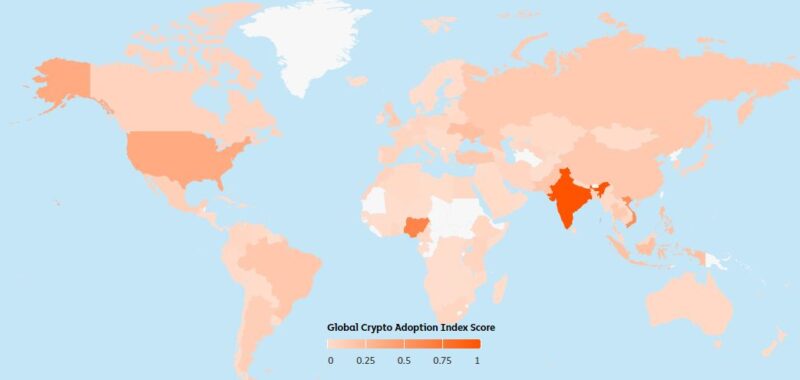Emerging nations are the fastest growing regions in crypto adoption and the growing presence of neo-banks plays the biggest role in this growth. Could these innovative platforms be the solution to financial inequalities and the lack of adequate banking services for over one billion people?
As Satoshi once remarked in his now-stopped social messages, “Bitcoin would be convenient for people who don’t have a credit card or don’t want to use the cards they have”. Emerging nations whether in Africa, Latin America or South East Asia could resonate more truly to this statement than others. Over the past half-decade, the growth of neo-banks in developing countries has caused a revolutionary change in how the populous interact in their economies and a radical change in their financial systems.
Crucially, the billions of unbanked and underbanked are finally integrated into the global financial systems, despite the lack of efficient banking structures in their respective nations.
This article will break down how cryptocurrency is benefiting the unbanked (and underbanked) and the role neo-banks play in providing financial services to countries with little hope of having a stable banking infrastructure. The piece further looks at the role developing countries play in growing the crypto ecosystem and various technological advancements in the industry as a result of rapid adoption across Sub-Saharan Africa, Latin America and Southeast Asia regions.
Financial Inequality in Underserved Economies
According to World Bank reports, over 1.2 billion people across the world are either unbanked or underbanked. Developing countries remain the most affected nations with over 50% of the population having little to no access to solid banking infrastructure or basic financial services such as loaning facilities, savings accounts, etc.
The advent of blockchain technology and cryptocurrencies sparked a drastic change in the global financial system, providing previously unavailable financial systems to citizens of these nations. The emergence of this decentralized industry is becoming a force in the global financial landscape, redefining traditional currency, transactions, and financial systems.
Cryptocurrencies, powered by blockchain technology and cryptographic principles, are opening up the financial world to developing nations, allowing previously unbanked and underbanked citizens to participate in the financial ecosystem. These assets have opened up new avenues to transact and store value by giving everyone access to fast and low-cost digital cash that can be spent anywhere.
The Rise of Neo-Banks and Decentralized Finance (DeFi)
The global financial crisis in 2008 brought rise to several innovations in the industry, majorly the growth of neo-banking. Neo-banks refer to financial technology firms that are redefining how banking services are delivered to consumers, from seamless digital experiences to lower transaction fees and accessibility via smartphones, etc.
The most prominent form of neo-banking arose in Kenya, with the launch of M-Pesa, a mobile-based financial service that allowed anyone with a SIM card and a phone to send and receive money. Over the years, such innovations have evolved into formidable players in the financial sector, as they revolutionize traditional banking and financial services.
Recently, decentralized finance (DeFi) apps have come to the fore, providing digital and decentralized alternatives that offer personalised user-centric services that resonate with crypto-savvy consumers. Notwithstanding, crypto exchange apps have sprouted rapidly offering anyone across the world an opportunity to access cryptocurrencies directly on their smartphones. These apps ensure advanced security measures, and seamless integration of fintech solutions, setting them apart from traditional finance services.
As such, developed countries have been able to join the global financial systems, signifying a paradigm shift in the transformative power of crypto for the modern consumer.
Crypto Exchanges May Challenge The Status Quo
As alluded to, crypto exchanges are diversifying to wider markets, moving from simple on-ramp and off-ramping business models to becoming neo-banks and challenging the traditional finance system – global, low-cost and very accessible to the unbanked. Crypto adoption is becoming more prominent for the 1.2 billion and financial services and products are more sophisticated and accessible. Could this pose a threat to the traditional banking systems?
The jury is still out on that but the solutions provided by these “decentralized neo-banks” are having a great effect on emerging nations’ economies – financial inclusion, low-cost remittance fees, and fast and secure transactions have driven the growth of crypto in these economies.
Boxwind, a digital asset exchange platform set to launch later in the year, brings these solutions to the 1.2 billion who need such services. From trading to lending, saving, trading, and a channel to affordably transfer crypto cryptocurrencies into and around emerging economies. The exchange is designed with advanced functionalities for new and experienced investors, providing spot and derivatives trading of over 300+ digital assets, on-ramp and off-ramp solutions, staking services, borrowing/lending and much more.
The platform also features its brainchild, PIP World, a service that aims to empower users via Edutech programs, gamified trading, and AI-powered gaming. PIP Trader, one of the gamefied and educative platforms, allows users to team up, battle in trading games, and earn rewards on an AI-powered game.
Looking Ahead
Chainalysis’ 2023 Crypto Report showed that over 40% of the world’s cryptocurrency users reside in lower-middle-income countries (LMICs), with the number growing every year. This impressive growth is heavily influenced by CEXs and the vast services they offer. Regulated crypto exchanges could be the main driver of sustained adoption rates by facilitating neo-banking services to the underbanked.
Crypto adoption in emerging economies presents a unique opportunity to empower individuals, enhance skills and financial literacy, and provide solutions to financial inequalities. For the industry to really grow, however, several things must be put in place including setting up secure platforms, regulatory compliance, users’ funds protection, easily accessible platforms, and educating the masses on the technology.

